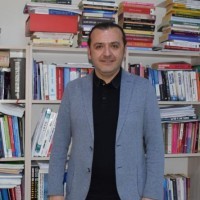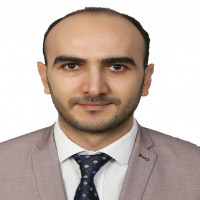Articles
Derleme Makaleleri
Issue Reviewers


Dr. Barış Eriçok is a faculty member at Ordu University, Faculty of Education. He holds a BA in English Language Teaching, an MA in Educational Administration, and a PhD in Educational Administration, Supervision, Planning, and Economics from Hacettepe University. His doctoral research focused on the internationalization policies of higher education in Türkiye. Currently, he is a postdoctoral researcher at the University College of Teacher Education Vienna (Pädagogische Hochschule Wien), Austria. His research interests include internationalization of higher education, educational leadership, international mobility, quality assurance, academic brain drain, and the implications of artificial intelligence for education. Dr. Eriçok actively contributes to national and international academic journals as an author and reviewer and is open to interdisciplinary research collaborations. Contact: barisericok[at]gmail.com

Rehberlik ve Psikolojik Danışmanlık, Okul Psikolojik Danışmanlığı, Psikolojik Danışmanlık Eğitimi, Logoterapi, EMDR



He is currently working in the Department of Education of the Visually Impaired at Gazi University, Faculty of Education. He completed his BA, MA and PhD in the Department of Education of the Visually Impaired at Gazi University. Aslan, who started working as a research assistant at Atatürk University in 2011, has been working in the Department of Education of the Visually Impaired at Gazi University, Faculty of Education, Department of Special Education since 2013. He works in the fields of functional vision, assistive/supportive technology, writing/written expression and education of the visually impaired in the field of Education of the Visually Impaired.







English
Turkish

Prof. Dr. Nesrin Oruç Ertürk Lisans eğitimini Anadolu Üniversitesi, Eğitim Fakültesi İngilizce Öğretmenliği bölümünde 1996 yılında tamamladıktan sonra 1998-1999 yılları arasında Bilkent Üniversitesi’nde yüksek lisans, ardından 2007 yılında yine aynı alanda Anadolu Üniversitesi’nde doktorasını tamamlamıştır. Prof. Dr. Ertürk, 2003-2004 yılları arasında Fulbright bursiyeri olarak (FLTA) Amerika Birleşik Devletleri SUNY’de (State University of New York) görev almıştır. 2004-2008 yılları arasında Dokuz Eylül Üniversitesi, Buca Eğitim Fakültesi, İngilizce Öğretmenliği bölümünde çalışan Ertürk yüzlerce öğretmenin yetiştirilmesine katkı vermiştir. 2019 yılında Prof. Dr. olarak atanan Ertürk, halen Ekonomi Üniversitesi, Mütercim Tercümanlık bölümünde ders vermekte, EKOSEM (Ekonomi Üniversitesi Sürekli Eğitim Merkezi) müdürlüğü ile beraber İngiliz Dili Eğitimi Yüksek Lisans programının ana bilim dalı başkanı olarak görev yapmaktadır.
Yaklaşık 25 yıldır görev yaptığı akademide 50’den fazla makalesi yayınlanan Ertürk’ün bunun dışında, 8 kitapta bölüm yazarlığı, 2 ulusal ve 3 uluslararası kitap yazarlığı ve editörlüğü bulunmaktadır.2023 yılında tamamladığı 2 Avrupa Birliği projesi dışında, 1 Avrupa Birliği proje partnerliği devam etmektedir. Projelerin ikisi öğretmen yetiştirme alanında olup, son dönemlerde özellikle kapsayıcı öğretim alanında eserler ve projeler yürütmektedir. Birçok ulusal ve uluslararası dergide hakemlik yapan Ertürk’ün farklı kurum ve kuruluşlardan aldığı ödülleri bulunmaktadır.

Görme Engellilerin Eğitimi, Kaynaştırma ve Bireyselleştirilmiş Eğitim Programı Hazırlama, Çoklu Yetersizliği Olan Çocukların Eğitimi, Görme ve Ek yetersizliği Olan Çocukların Eğitimi, Körsağır Çocukların Eğitimi



Serafettin Gedik is an Assistant Professor in the Department of Educational Sciences at Amasya University, specializing in School Administration. His research interests revolve around school leadership as it pertains to the issues of equity, school culture, and community engagement. Some of his recent articles has been published at International Journal of Inclusive Education, Journal of Child and Family Studies, Journal of Multilingual Education Research, School Community Journal, and Professional Development in Education. Additionally, he serves as the Assistant Director of the Graduate School for Social Sciences at Amasya University.








 Web
Web
İbrahim Çolak has Phd on Educational administration. His research interests are critical pedagogy, teacher autonomy, organizational behaviors, and a critical look at education system.
Aim & Scope
Kocaeli University Journal of Education is published by Kocaeli University Faculty of Education. Kocaeli University Journal of Education aims to be a original reference source for "Education Sciences" and "Teacher Training Programs".
The journal is a double-blind peer-reviewed and scientific journal published electronically, aiming to be indexed in national and international indexes, where theoretical and applied original research articles and review studies that contribute to the field, especially in “Educational Sciences” and “Teacher Training” are published.
The publication language of the journal is Turkish or English. The journal is published twice a year in May and November. In addition, special issues (e.g., congress proceedings) may be published separately. The editorial rules and policies of the journal also apply to these issues.
Author Guidelines
The articles that will be submitted to Kocaeli University Journal of Education must be primarily in accordance with the research and publication ethics. In this context, the manuscripts to be sent to our journal should be in accordance with the "Ethical Responsibilities and Policies" described at https://dergipark.org.tr/kuje/page/5270.
The articles to be submitted to Kocaeli University Journal of Education should be prepared according to the following rules.
According to the spelling rules, click to download the template prepared in MS-Word word processing software.
Article Heading
Türkçe: 16 punto, Cambria, sola dayalı, sağ girinti 3 cm, her kelimenin sadece ilk harfi büyük harfle yazılmalıdır, sonrasında 6 pt boşluk
İngilizce: 16 punto, Cambria, sağa dayalı, sol girinti 3 cm, her kelimenin sadece ilk harfi büyük harfle yazılmalıdır, öncesinde 6 pt boşluk
Author Information
Yazar isimleri 12 punto, Cambria, kalın olarak ve alt alta yazılmalıdır.
Yazar isimlerinden sonra “,” koyularak kurum bilgisi (Üniversite adı, vb.), birim bilgisi (fakülte adı, vb.) ve e-posta adresi italik olarak yazılmalıdır.
Öz
Makalenin geneli hakkında fikir verecek şekilde Cambria, 10 punto ile 1 satır aralığında yazılmış, 250-300 kelime aralığında olmalı. Öz’de çalışmanın temelini oluşturan kavramlara yer verilmeli, araştırmanın amacına ve özelde araştırma odağına yer verilmelidir. Çalışmanın yöntem ve deseni ile veri toplama araçlarından bahsedilmelidir. Çalışmanın öne çıkan bulguları sunulduktan sonra araştırmanın sonuçlarına yer verilerek öz bölümü tamamlanmalıdır.
Öz bölümünü Anahtar Sözcükler bölümü takip etmelidir. Anahtar sözcükten sonra virgül konularak, anahtar sözcükler birbirinden ayrılmalıdır. Anahtar sözcüklerin 3 ile 5 arasında olması beklenilmektedir. Anahtar sözcükler, Cambria, 10 punto, yalnızca ilk kelimenin ilk harfi büyük olarak yazılmalıdır.
Abstract
Öz bölümünü İngilizce Abstract bölümü takip etmelidir. Öz için geçerli olan yazım kuralları geçerlidir. Anahtar sözcükler yerine Keywords ifadesi kullanılmalıdır.
First Level Headings
Birinci seviye başlıklar (Örneğin Giriş, Yöntem, Sonuçlar, Kaynakça, gibi) yazılırken tüm kelimeler BÜYÜK HARF olarak yazılmalıdır. Yazı Tipi: Kalın, Yazı Biçimi (Font): Cambria, Yazı Tipi Boyutu: 12 olarak belirlenmelidir. Paragraf biçimi olarak Hizalama: Sol, Aralık Önce: 12 nk ve Sonra: 3 nk olarak belirlenmeli, Satır aralığı: 1 (tek) seçilmelidir.
Second Level Headings
İkinci seviye başlıklar (Örneğin, Yöntem birinci seviye başlığı altında yer alan Katılımcılar/Örneklem alt başlığı) için kullanılması gereken biçimsel yapılandırma şu şekildedir: Her kelimenin sadece ilk harfi büyük harf olarak yazılmalıdır. Yazı Tipi: Kalın, Yazı Biçimi (Font): Cambria, Yazı Tipi Boyutu: 12 olarak belirlenmelidir. Paragraf biçimi olarak; Hizalama: Sol, Aralık Önce: 12 nk ve Sonra: 3 nk olarak belirlenmeli, Satır aralığı: 1 (tek) seçilmelidir.
Third level heading
Üçüncü seviye başlıklar (Örneğin Katılımcılar/Örneklem ikinci seviye başlığı altında yer alan Katılımcıların belirlenmesinde izlenilen yöntem alt başlığı) kullanılması gereken biçimsel yapılandırma şu şekildedir: Sadece ilk kelimenin ilk harfi büyük harf olarak yazılmalıdır. Yazı Tipi: Kalın, Yazı Biçimi (Font): Cambria, Yazı Tipi Boyutu: 11 olarak belirlenmelidir. Paragraf biçimi olarak; Hizalama: Sol, Aralık Önce: 12 nk ve Sonra: 3 nk olarak belirlenmeli, Satır aralığı: 1 (tek) seçilmelidir.
Text
Tüm makale boyunca metin için kullanılması gereken biçimsel yapılandırma şu şekildedir: Yazı Tipi: Cambria, Yazı Tipi Boyutu: 11 kullanılmalıdır. Paragraf biçimi olarak; Hizalama: Yasla (iki yana yasla), Aralık Önce: 0 nk ve Sonra: 6 nk olarak belirlenmeli, Satır aralığı: 1 (tek) seçilmelidir.
Image Headings
Şekil başlığı şeklin altında yer almalıdır. Başlığın yazımında sadece ilk kelimenin ilk harfi büyük harf olarak yazılmalıdır. Kullanılması gereken biçimsel yapılandırma şu şekildedir: Yazı Tipi: Normal, Yazı Biçimi (Font): Cambria, Yazı Tipi Boyutu: 10 kullanılmalıdır. Paragraf biçimi olarak; Hizalama: Ortalanmış, Aralık Önce: 6 nk ve Sonra: 12 nk olarak belirlenmeli, Satır aralığı: 1 (tek) seçilmelidir.
Table Headings
Tablo başlığı tablonun üstünde yer almalıdır. Başlığın yazımında sadece ilk kelimenin ilk harfi büyük harf olarak yazılmalıdır. Kullanılması gereken biçimsel yapılandırma şu şekildedir: Yazı Tipi: Normal, Yazı Biçimi (Font): Cambria, Yazı Tipi Boyutu: 10 kullanılmalıdır. Paragraf biçimi olarak; Hizalama: Sol, Aralık Önce: 12 nk ve Sonra: 0 nk belirlenmeli, Satır aralığı: 1 (tek) seçilmelidir.
Tablo içi metinlerde de Yazı Tipi Boyutu: 10 olarak kullanılmalıdır. Verilerinde sunumunda ondalıklar için nokta (.) kullanılmalıdır. Yine metin içerisinde tabloya tablo numarası ile birlikte atıf verilmeli ve tablo içerisinde sunulan verilere atıf verilirken aynı yazım kuralına uyulmalı ve ondalıklar için nokta (.) kullanılmalıdır.
Tablodan sonra eğer metin ile devam ediliyorsa “Gir tuşu” (“Enter”) ile bir satırlık boşluk oluşturulmalıdır. Eğer tablodan sonra doğrudan bir başlık geliyor ise fazladan “Gir tuşu” (“Enter”) ile boşluk bırakılmasına gerek yoktur. Zaten başlık stillerinde Aralık Önce: 12 nk olarak tanımlıdır.
REFERENCES
Kaynakça birinci seviye başlık olarak yazılmalıdır. Metin içerisindeki tüm atıflara kaynakça altında MUTLAKA yer verilmelidir. Kaynakça altında yer verilen tüm kaynaklara da MUTLAKA metin içerisinde atıf verilmiş olmalıdır. Bu çapraz kontrolün yapılması yazar(lar)ın sorumluluğu altındadır.
Kaynakların sunumunda APA 6 kurallarına uyulmalıdır. Kullanılması gereken biçimsel yapılandırma şu şekildedir: Kullanılması gereken biçimsel yapılandırma şu şekildedir: Yazı Tipi: Normal, Yazı Biçimi (Font): Cambria, Yazı Tipi Boyutu: 10 kullanılmalıdır. Paragraf biçimi olarak; Aralık Önce: 0 nk ve Sonra: 3 nk olarak belirlenmeli, Satır aralığı: 1 (tek) seçilmelidir. Asılı girintileme: 0,6 cm olarak belirlenmelidir.
Sık kullanılan kaynakça çeşitleri için Şablonda örneklere yer verilmiştir:
Extended Abstract in English
Çalışmanın sonunda genişletilmiş İngilizce Öz’e yer verilmelidir. Metin biçimlendirmesi (11punto büyüklüğünde, Cambria karakteri kullanılarak) bozulmadan, 750-1000 kelimeden oluşan geniş İngilizce öz yazılmalıdır. Bu öz alt başlıklar (Introduction, Method, Results, Discussion and Conclusion vb.) içermeli, makalenin temel fikirlerinin tümünü kapsayacak biçimde, paragraflar halinde olmalıdır. Geniş İngilizce öz yeni bir sayfadan başlamalıdır.
Ethical Principles and Publication Policy
ETHICAL PRINCIPLES AND RESPONSIBILITIES
Ethics has become an indispensable part of our daily lives with the increasing awareness, publication and adoption of ethics. ICMJE (International Committee of Medical Journal Editors) recommendations and COPE (Committee on Publication Ethics) International Standards for Editors and Authors are taken into consideration in all scientific manuscripts submitted to our journal.
ICMJE (International Committee of Medical Journal Editors): https://www.icmje.org
COPE International standards for editors and authors: https://publicationethics.org/resources/resources-and-further-reading/international-standards-editors-and-authors
In addition, the authors of the article must comply with all the rules specified to be followed within the scope of the “Directive on Scientific Research and Publication Ethics of Higher Education Institutions” (https://www.yok.gov.tr/Sayfalar/Kurumsal/mevzuat/bilimsel-arastirma-ve-etik-yonetmeligi.aspx) in the whole process from the planning, implementation, data collection and data analysis of the research. None of the actions specified under the second section of the Directive, “Actions Contrary to Scientific Research and Publication Ethics”, must have been carried out and the authors must make a statement in this context under the Research Ethics heading under the Methodology of their articles.
Policies, legislations, directives, guidelines, etc. related to ethics are published both at the senior management level, such as the T.R. Prime Ministry Public Officials Ethics Board (http://etik.gov.tr/tr-tr), and at the local government level, such as Kocaeli University Ethics Board (http://etikkurul.kocaeli.edu.tr). In this context, we recommend that scientists carefully read the following two articles published by the Ethics Board of Public Officials of the Prime Ministry of the Republic of Turkey:
Ethical Principles in Scientific Research and Publications - Prof . Dr. Şevket RUACAN, Institute of Oncology, Hacettepe University, http://etik.gov.tr/wp-content/uploads/2019/03/sevketruacan-bilimselarastirmaveyayinlardaetik.pdf
Scientific Publication Ethics (Types of Scientific Misrepresentation with Examples) - Assoc. Prof. Dr. Yeşim Işıl Ülman, Cerrahpaşa Faculty of Medicine, Istanbul University http://etik.gov.tr/wp-content/uploads/2019/03/yesimisilulman-yayinetigi.pdf
In this context, it is important that all individuals and organizations serving in the field of science adopt the principles and values of professional ethics and practice the right behaviors. The following responsibilities have been compiled from the above-mentioned sources within this framework.
Ethics Committee Permission
TR-Dizin has defined the Code of Ethics as follows (Article 8 under the title “TR-Dizin Journal Evaluation Criteria” at https://trdizin.gov.tr/kriterler) and authors are required to comply with these rules.
8.1. For research in all disciplines that require ethics committee approval (ethics committee approval must be obtained, this approval must be stated and documented in the article.
8.2 For studies requiring ethics committee approval, information about the approval (name of the committee, date and number) should be included in the method section, as well as on one of the first/last pages of the article; in case reports, information on the signing of the informed consent form should be included in the article.
8.3. The journal web page should include a statement that the articles comply with Research and Publication Ethics. Our journal article template includes headings (both at the end of the methods section and before the bibliography) with these statements. Please use our current article template: https://dergipark.org.tr/tr/pub/kuje/writing-rules
Copyright regulations must be respected for the intellectual and artistic works used.
Ethical Responsibilities of Authors
Kocaeli University Journal of Education has adopted the “Double Blind Review Process”. In this framework, the application and evaluation processes of the articles are carried out through the DergiPark system. The articles assigned by the Field Editors to the referees for evaluation are submitted through the system in a way that guarantees Blind Refereeing (by deleting personal information etc. from the Word document). In this context, the communications to be carried out regarding a study are carried out through the Field Editor.
The corresponding author of a study can use the communication window opened by the Field Editor for all communication requirements. All evaluations and comments are made through the communication window on the DergiPark platform. The evaluation forms, comments and necessary files submitted by the reviewer are forwarded to the corresponding author by the Field Editor in a way that does not violate blind reviewing.
The author(s) submitting a study to Kocaeli University Journal of Education must comply with the following ethical responsibilities:
In order to be included among the authors of the study, the following three conditions must be met: “a) contribute to the planning, design, analysis or interpretation of the study, b) prepare the publication or make a significant intellectual contribution
Price Policy
The copyrights of the published articles belong to the authors of the study without any restrictions. On the other hand, the publication rights of the published articles belong to Kocaeli University Journal of Education. Kocaeli University Journal of Education is an open access journal. Within this framework, authors can share access to the full text files of their studies in any way they wish. As required by academic tradition, citation is expected.
No fee/payment is requested from the author or his/her organization under any name at any stage, and no copyright fee/payment is paid to the authors in any way.

